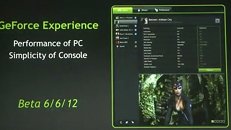Monday, April 30th 2012

NVIDIA Unveils GeForce Experience
NVIDIA unveiled GeForce Experience, a new cloud-based technology that assesses PC hardware and tweaks settings of games to deliver the most optimal gaming experience. GeForce Experience goes a step beyond today's System Requirements Labs applets, and assesses hardware at a much more minute scale, sends information back to a data center that houses supercomputers, which methodically build the perfect game settings for each GPU, CPU, motherboard, and drivers configuration.
Speaking at GeForce LAN Shanghai, NVIDIA president and CEO Jen-Hsun Huang said that PC games require a greater knowledge about the capabilities of the system than required by consoles. To get the most out of PC games, gamers need to dig into its settings and tweak them to work best with the hardware available, and that could be a disadvantage compared to consoles.According to NVIDIA's statistics, a disturbing 80% of PC gamers don't tinker with their quality settings, and end up with sub-optimal visual experience compared to consoles. In contrast consoles have, since the beginning of their time, been as simple as inserting the game disc/cartridge and pushing the power button. Huang said his crew was looking to take PC gaming as close to that experience as possible, with NVIDIA GeForce Experience.
Source:
The Verge
Speaking at GeForce LAN Shanghai, NVIDIA president and CEO Jen-Hsun Huang said that PC games require a greater knowledge about the capabilities of the system than required by consoles. To get the most out of PC games, gamers need to dig into its settings and tweak them to work best with the hardware available, and that could be a disadvantage compared to consoles.According to NVIDIA's statistics, a disturbing 80% of PC gamers don't tinker with their quality settings, and end up with sub-optimal visual experience compared to consoles. In contrast consoles have, since the beginning of their time, been as simple as inserting the game disc/cartridge and pushing the power button. Huang said his crew was looking to take PC gaming as close to that experience as possible, with NVIDIA GeForce Experience.

43 Comments on NVIDIA Unveils GeForce Experience
Then you just make rules, if the framerate is lower than that, turn off things gradually till it meets the target framerate. When its done, settings are saved and user is notified.
They could easily modify settings or re-run the assessment if they upgrade some component.
No need for the cloud and future proof forever. If the framerate is too low, it will degrade settings, if framerate constantly exceeds 60fps, it would set everything to max.
As simple as that.
*drumroll*
The winner of the most pointless waste of dev money award goes to...nVidia!!
i think the best way is to work closely with game developers so each game can start with a benchmark the first time you start it, and have it set the thng accordingly, i know most games have that but its only optional
however this kinda reminds me of steambox in a way, i wonder if that will ever come to reality tho
First Nvidia takes OCing out of the end user's control and now this :shadedshu:cool:
2. Nvidia won't be able to do it because they don't know how each developer has designed their games (as in which files and how to benchmark).
3. Games developers won't do it because it would be a waste of their time and money and if each game has its own benchmark tool, it will be redundant; think of HD space waste.
2. NVIDIA won't make that, game developers would. So it's irrelevant.
3. What HDD space if you just re-use what you've already made for the game. Adding a short flyby path on top of existing level would add what, extra 50MB (and i'm being very generous)? With games that are 15+ GB in size, that's nothing.
Since each game works differently, the algorithm for each Benchmark tool will be different, hence the waste of time and money.
I don't think you actually understand the scale of such project. As syeef said, the algorithm wouldn't be the same for every game, since every game is different, you wouldn't even know what to look for in some games (which settings to increase/lower). Plus I don't think that developers or GPU manufacturers care about it, they just see it as an extra cost.
I saw the process of making an algorithm for website search engine (I can't remember the details, it was a few years back), but I can tell you that even tho it seemed a really simple thing to do, the work put into it was just huge.
Here's a cheaper and easier way than making an algorithm: educate people how to properly set up the game.
Aside from Nvidia control panel settings ofc.
Anyway, a lot of the games I play, I'd say as much as 75% of them create a txt config file in the game data path or in the documents folder, which would be supereasy to edit with an automatic txt editor built into the tool. I'm sure ALL games have such files even though some of them are hidden somewhere intead of being an accessible and easily recognizable text file.
They DO have a lot of control over how most games would look, with only a very small contribution from the game developers, basically pointing to the config file.
And as others said this is a task that is better performed by someone like Nvidia/AMD, Steam (would be better) or even Microsoft and not something done by every developer beause it costs a ton to collect and test all the data necessary to optimize every single system config out there, and if done ONCE it is much cheaper, than doing it all over again. That's why TWIMTBP and Game Evolved exist and MUST exist and why performance is so much better in said games. Optimizing is anything but easy and nowadays it is not only that developers are lazy or tme contrained, it's that complexity is very high and they need the help from someone powerful and who has all the info on what kind of systems are out there and their capabilities, fetures, etc.
It's like with middleware, it exists because it's the better and cheaper option. Work it's done once and optimized once and then its adjusted for every game as required. In the case of Nvidia's new tool, it means that they will look extensively for which kind of impact each feature* has on each system. And only after this guideline is created, they will probably go on tweaking for every game they posibly can. The first part: looking for how each feature impacts performance on each of the multitude of hardware configurations is probably in the excess of 90% of the work done for each game. Of course Nvidia will have to do the last 10% a thousands times to covert all games, but it's still a better thing than each developer doing the 90%, because it's basically something they will NOT do, they will not spend time and money doing it, ever.
*Different lighting models, shadows, occlusion mapping, texture size and compression, shader lenght and complexity, tesselation, extension and variablity of accesses to sytem RAM and HDD for each card, everything else, you name it...
On a serious note, I think this is a good thing. It will help the less informed gamers that tend to go with consoles due to the simplicity of setup. Those of us that already tweak settings will see this as pointless, but most gamers will benefit from this, and it might even bring a little more business to the PC gaming side, which is always a good thing.
Is it a data mining thing? Not really any more than Steam or System Requirements Lab. It isn't like it runs constantly collecting data on every little thing you do on your PC.
Also, nVidia isn't forcing you to use it, so if you don't want it don't use it, simple. Don't bitch about it.
This is just another way, as i see it, to make gaming streamlined across ALL platform's. Which IMO is bad for PC gaming :o
People complain about all the console port's, well :rolleyes:
The way i see it is; Nvidia is taking the enthusiasm out of being an enthusiast!